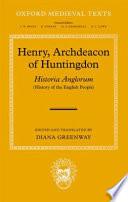“When he was at the height of his ascendancy, he ordered his chair to be placed on the sea-shore as the tide was coming in. Then he said to the rising tide, "You are subject to me, as the land on which I am sitting is mine, and no one has resisted my overlordship with impunity. I command you, therefore, not to rise on to my land, nor to presume to wet the clothing or limbs of your master."”
Quod cum in maximo uigore floreret imperii, sedile suum in littore maris cum ascenderet statui iussit. Dixit autem mari ascendenti: "Tu mee dicionis es, et terra in qua sedeo mea est, nec fuit qui inpune meo resisteret imperio. Impero igitur tibi ne in terram meam ascendas, nec uestes uel membra dominatoris tui madefacere presumas."
Book VI, §1, pp. 366-9.
Historia Anglorum (The History of the English People)
